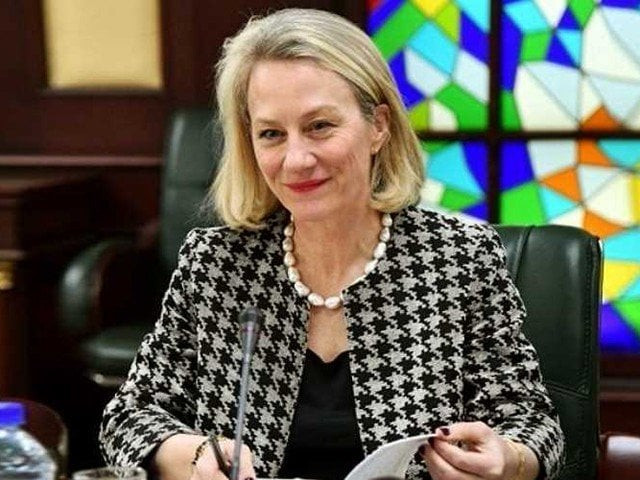Wells’ CPEC onslaught
There is struggle between global & regional players over expansion of their political and economic sphere of influence

US diplomat Alice Wells
Visiting senior US diplomat, Alice Wells, who oversees South and Central Asia for the US administration, had renewed criticism over the multibillion-dollar CPEC project. Ambassador Wells precisely did a repeat of what she alleged at Woodrow Wilson Centre in November last year. While pointing to CPEC, she cast aspersion to Chinese investment and development model. She said Pakistan would be at high risk of debt stress due to Chinese financing and warned that it would cause hardships for Pakistan at the time of repayment in couple of years. She also hinted at issues of cost and transparency. Like November 2019, Chinese Embassy issued a strongly-worded rebuttal dismissing allegations as an attempt to interfere in Pakistan-China ties. Addressing fears on borrowing, it was stated that CPEC loans were 5.3% of Pakistan total foreign debts with repayment period of 20-25 years. Industrial cooperation, infrastructure development and energy projects would help boost Pakistan’s economy. Besides, China always assisted Pakistan without any political consideration.
Wells well thought-out outburst reflects politico-economic unease of the US and appears that it now has a considered opinion about the Belt and Road Initiative (BRI) and CPEC and recurrently reiterates that the BRI and CPEC do not seem to be an economic undertaking but is part of the bigger game plan that China has unfolded towards newer international order.
Over a period of time, a discourse on CPEC evolved focusing on global, regional, bilateral and domestic dimensions to it. The BRI is about Chinese vision of how it views ‘economic geography’ of the globe and how it would wish to sail through it. Chinese model flowing from Chinese vision runs contrary to the existing model spearheaded by the US. Global and regional wave of hostility to the BRI and CPEC becomes known where India too opposes this economic project on political grounds.
Bilaterally, CPEC is not considered as an economic venture but it is reflection of a special relationship that Pakistan and China have built over time. Domestically, there are elements voicing their concerns or there may be few occasions where Pakistan might have fallen short on doing what was required but there exists a consensus in the entire country that CPEC is an economic framework that carries promise of huge economic development in Pakistan.
There is struggle between global and regional players over expansion of their political and economic sphere of influence. That is how China’s adversaries interpret Chinese vision of politico-economic world as flawed. On the contrary, China terms the BRI as a project that would create win-win cooperation among the partners and would advance the vision of shared destiny and shared future. Most Pakistanis think CPEC is in Pakistan’s national interest that promises well-being and prosperity of people. And Pakistan must take advantage of this huge opportunity and do it in the best possible manner. It’s about time that Pakistan must identify its core politico-economic interests and stand firm on them. As for Ms Wells’ advice, one might consider demerits of any future Chinese trap but we know we have a history of enduring Western (IMF) trap. As a long-time ally, Pakistan looks up to the US for help on FATF, India-occupied Kashmir and the economic woes it is confronted with. It’s time to demonstrate that the US values Pakistan’s friendship.
Published in The Express Tribune, January 30th, 2020.
Like Opinion & Editorial on Facebook, follow @ETOpEd on Twitter to receive all updates on all our daily pieces.















COMMENTS
Comments are moderated and generally will be posted if they are on-topic and not abusive.
For more information, please see our Comments FAQ